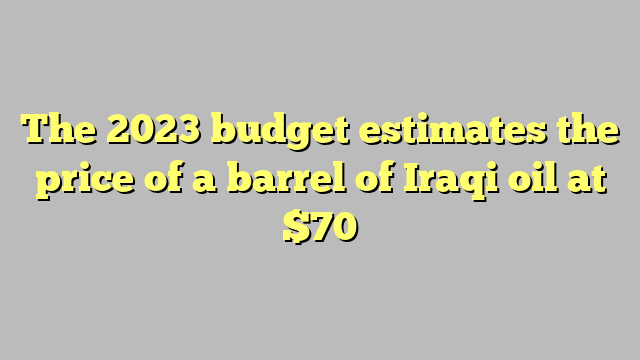Iraq’s 2023 budget estimated the price of a barrel of Iraqi oil at $70, amid fears of the impact of stopping exports from the Kurdistan region on the country’s public revenues, as an international court ruling against Turkey halted the flow of 450,000 barrels per day towards the port of Ceyhan.
Late yesterday, Sunday, June 11 (2023), Iraq, the second largest producer in the Organization of the Petroleum Exporting Countries (OPEC), approved its budget for 2023 amounting to $153 billion (198.9 trillion dinars).
Iraq’s 2023 budget was based on an oil price of $70 a barrel, which is the value the government adopted in its estimates for the new budget during its meeting on March 13.
The budget deficit is estimated at 64.36 trillion Iraqi dinars ($49 billion), which is a record high, and more than double the last recorded budget deficit in 2021.
Iraqi oil revenues
Oil revenues are the most important income for Iraq, as they represent more than 90% of its total revenues, according to data seen by the specialized energy platform.
The government estimated oil revenues in the Iraq budget 2023 at 117.252 trillion dinars ($89.4 billion), while non-oil revenues amounted to 17.301 trillion dinars ($13.2 billion).
Iraq’s 2023 budget was based on the assumption that oil exports would be 3.5 million barrels per day, including 400,000 barrels per day from the Kurdistan region.
Iraq exported an average of 3.3 million barrels per day of oil in May, which is flat compared to April, according to the Iraqi Oil Ministry.
Oil exports supported Iraq’s budget during 2022 by about $115.4 billion, an annual increase of 52.5%, compared to $75.7 billion in 2021.
The following infographic, prepared by the Energy Platform, reviews Iraqi oil export revenues in 2022:

Kurdistan oil
Besides estimating the price of a barrel of Iraqi oil at $70, the 2023 state budget – approved by parliament after months of wrangling – includes new provisions regarding the sharing of oil revenues between the federal government in Baghdad and the semi-autonomous region of Kurdistan in the north.
The new provisions state that Kurdistan will deposit the revenues from its oil exports into a bank account that the central government can monitor, and the federal government will deduct the amount of oil revenues from Kurdistan’s monthly budget allocations.
Iraq currently exports oil only through its southern oil export ports, with around 450,000 barrels per day of exports from the northern fields and from Kurdistan shut down due to a dispute over who should authorize Kurdish exports.
Under an agreement struck between Baghdad and Erbil in April, the state-run Iraqi Oil Marketing Company (SOMO) will have the authority to market and export crude oil produced by fields controlled by the Kurdistan region.
Revenues from the export of the region’s oil should be deposited in a bank account opened by the Federal Ministry of Finance at the Central Bank of Iraq.
Officials in Iraqi Kurdistan had expressed their objection in recent weeks to the amendments to the oil-related articles, but the Kurdistan Democratic Party, which dominates the government in Erbil, announced its “approval” of the Iraq Budget Law 2023 in parliament, in order to allow room for payment. Kurdish employees’ salaries are provided by the central government.
International Oil Fund forecasts
The International Monetary Fund said at the end of last May that economic growth in Iraq has lost its momentum in recent months, due to the volatility of the foreign exchange market and the decline in oil production.
The IMF team of experts said: “The combined effects of increased government spending, a revaluation of the exchange rate, and a drop in oil production will raise the fiscal breakeven price of oil to $96 a barrel.”
Iraq is waiting for the new Turkish government to agree to export oil from the north, which stopped on March 25, after an international arbitration decision obligated Ankara to pay compensation to Baghdad. For violating the 1973 pipeline agreement, by allowing the region’s oil to be exported without Baghdad’s approval between 2014 and 2018.

Leave a Reply